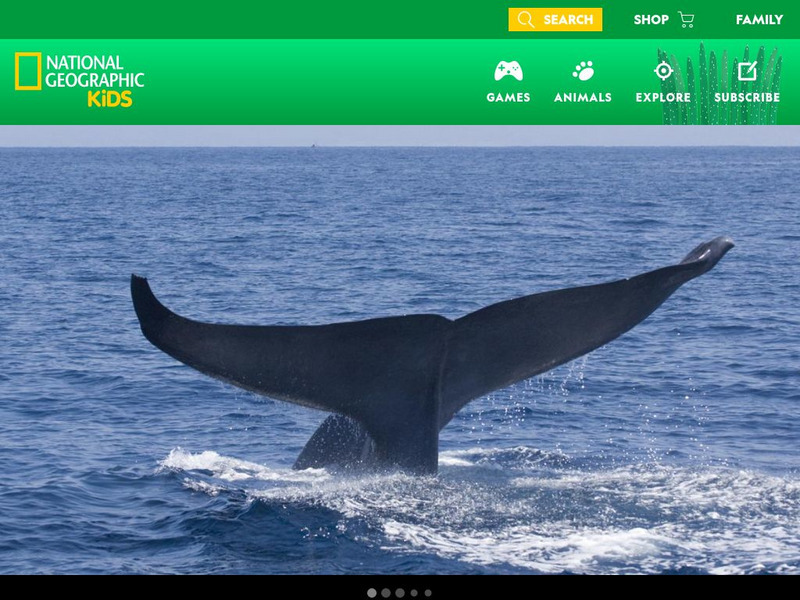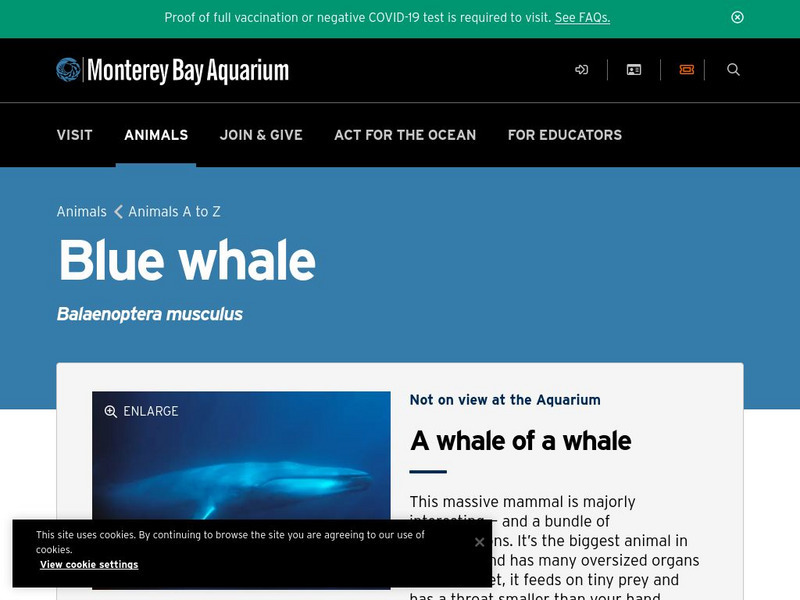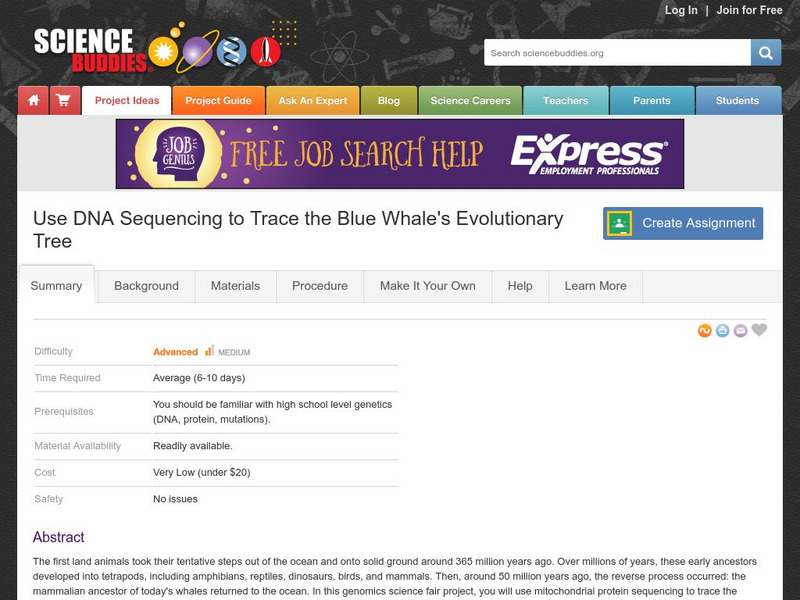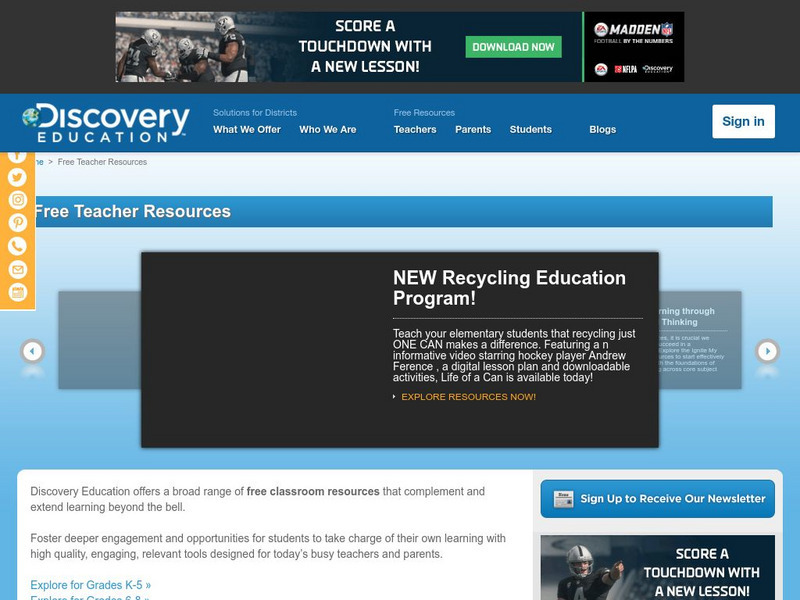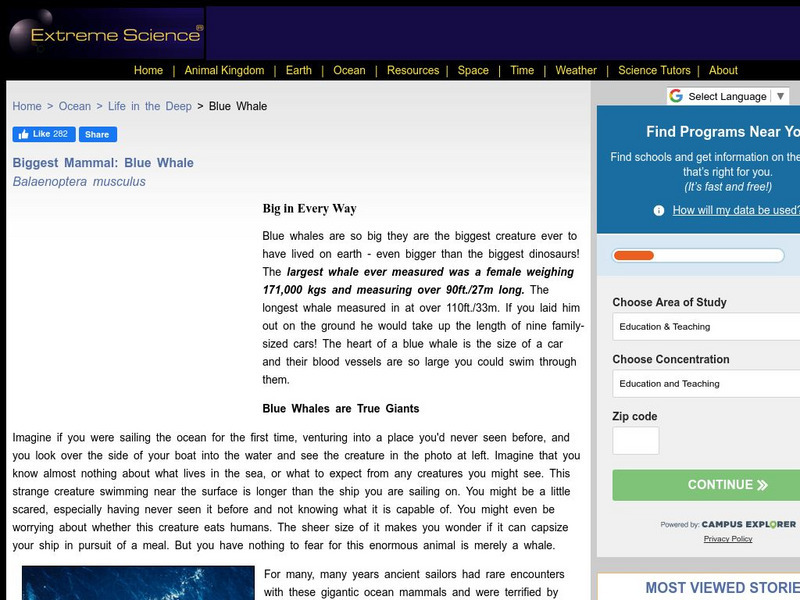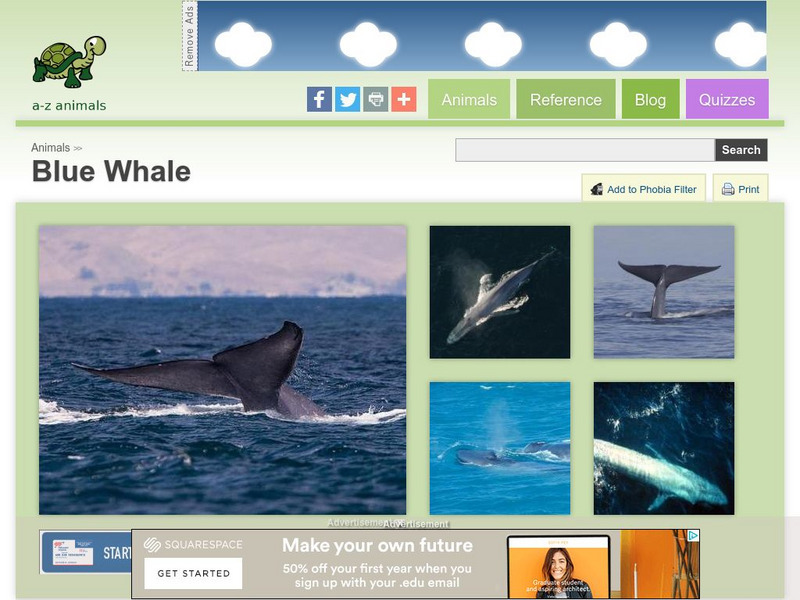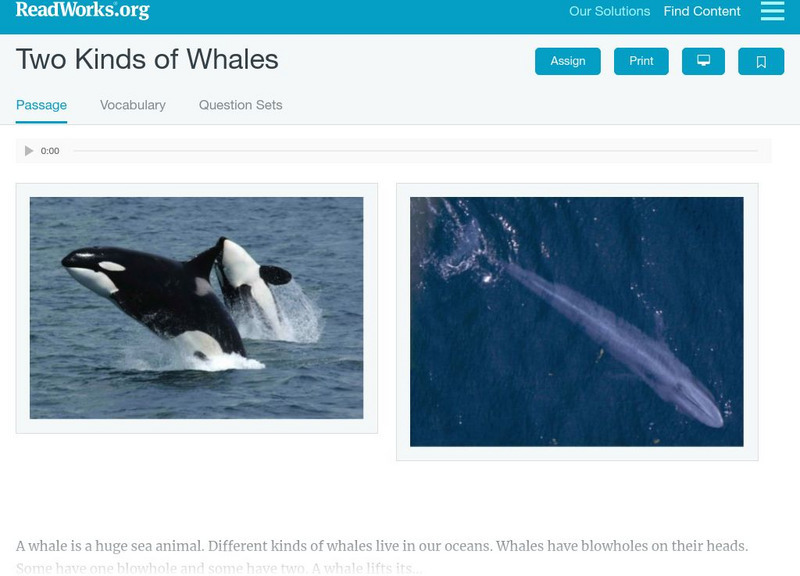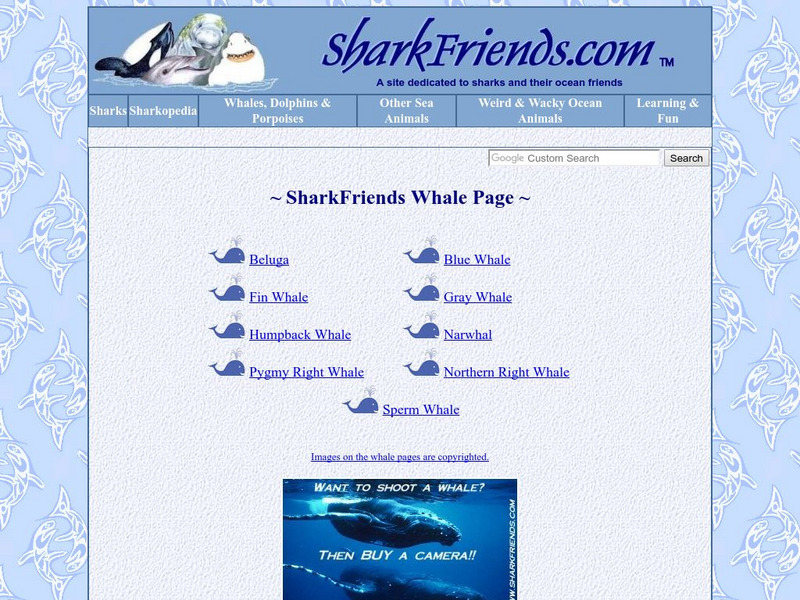Curated OER
Relative Pronoun Gap Fill
In this ESL pronouns worksheet, students read and analyze a friendly letter that has missing words. Using the relative pronouns from a word bank, students fill in the spaces.
Curated OER
Answering Science Questions
Students examine the ways in which scientists answer questions. In this critical thinking and scientific process lesson students complete a worksheet of questions.
National Geographic Kids
National Geographic Kids: Animals: Blue Whales
Do you know that the blue whale is the largest animal to ever live on Earth? Take an exciting look at this mammal with easy to read facts including habitat, appearance, young, mating, diet, enemies, as well as colorful photos. Links to...
Monterey Bay Aquarium
Monterey Bay Aquarium: Blue Whale (Balenoptera Musculus)
Resource that gives information on the diet, range, relatives of the blue whale. Conservation notes and cool facts are also included. There are links to similar information on dozens of other types of marine life.
Other
Save the Whales: Blue Whale
The Blue Whales are endangered. Find out why in this highly informative Save the Whales site. Behavioral characteristics, diet, habit, and more are examined in this colorful site.
Science Buddies
Science Buddies: Use Dna Sequencing to Trace the Blue Whale's Evolutionary Tree
Around 50 million years ago, the mammalian ancestor of today's whales returned to the ocean. In this genomics science fair project, you will use mitochondrial protein sequencing to trace the evolution of whales and identify their closest...
Discovery Education
Discovery Education: Planet Ocean: Blue Whale
This webpage provides a nice description of the Blue Whale along with several photos.
MarineBio Conservation Society
Marine Bio: Blue Whales
Discover useful information about blue whales including description, behavior, range, habitat, diet, breeding, and conservation status.
Extreme Science
Extreme Science: Largest Mammal: Blue Whale
Read all about the blue whale, the largest living mammal. A two-minute video is presented, as well as the sound of a blue whale singing.
TED Talks
Ted: Ted Ed: Why Are Blue Whales So Enormous?
Blue whales are the largest animals on the planet, but what helps them grow to the length of a basketball court? Asha de Vos explains why the size of krill make them the ideal food for the blue whale. [5:21]
A-Z Animals
A Z Animals: Animal Facts: Blue Whale (Balsenoptera Musculus)
Provides an overview of the Blue Whale, including their habitat, appearance, behaviour, diet, breeding, and much more. Images of this species and statistics can also be found here.
Read Works
Read Works: Two Kinds of Whales
[Free Registration/Login Required] An information text telling similarities and differences between killer whales and blue whales. A question sheet is available to help students build skills in reading comprehension.
BBC
Bbc Science & Nature: Blue Whale
Get the facts on the largest animal in the world- past and present. This site provides a detailed fact sheet and photos.
Other
Save the Whales
The Blue Whale, Beluga Whale, Southern Right Whale, Gray Whale, and Sperm Whale are endangered. Find out why in this informative and colorful site.
NPR: National Public Radio
Npr: Blue Whale Sighting Thrills Researchers
National Public Radio reports on the blue whale, which has been on the endangered species list for almost 40 years. Find out why a recent siting off the coast of Alaska has given researchers some cause for optimism.
Smithsonian Institution
National Museum of Natural History: American Mammals: Blue Whale
As far as we know, the blue whale is the largest animal ever to have existed on the planet. Weights up to 190,000 kg (as much as 30-40 African elephants) have been recorded. Learn more about the Balaenoptera musculus, more commonly known...
Ducksters
Ducksters: Blue Whale for Kids: Learn About the Giant Mammal.
What are blue whales? Kids find out about the largest mammal on earth that lives in the ocean.
Canadian Museum of Nature
Canadian Museum of Nature: Blue Whale
The blue whale is believed to be the largest animal that has ever existed on Earth, even larger than dinosaurs were. These gentle creatures are at risk and only about 10,000 remain today. Learn some interesting facts about them here.
Other
Shark Friends Whale Page
Dive down deep with these creatures and learn more about them without leaving your computer. Site contains information on different types of whales such as gray, northern right, fin, blue and other species.
Enchanted Learning
Enchanted Learning: All About Whales
This site provides a great deal of information about whales.
NOAA
Noaa: Pmel: Acoustic Monitoring, Bioacoustics
Outlines the National Marine Mammal Laboratory's project studying whale acoustics (the sounds whales make). Links to clear acoustics tutorial. Also includes whale biology, with acoustic descriptions and sound clips of their calls. Very...
Curated OER
Blue Whale Breaks the Surface Off Alaska Coast
National Public Radio reports on the blue whale, which has been on the endangered species list for almost 40 years. Find out why a recent siting off the coast of Alaska has given researchers some cause for optimism.
Other
Fishin for Facts Library
A comprehensive site that includes a wealth of information on whales, sharks, penguins and squid.
Other popular searches
- Blue Whales Life Cycle
- Big Blue Whales
- Writing About Blue Whales
- Blue Whales Graph
- Pictures of Blue Whales
- Learning About Blue Whales
- Orca and Blue Whales
- Blue Whales Model
- Or Ca and Blue Whales




